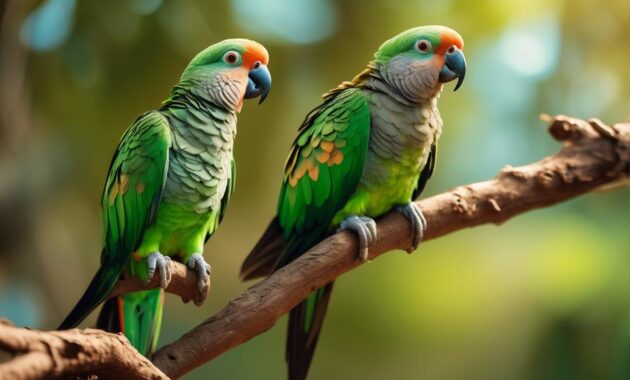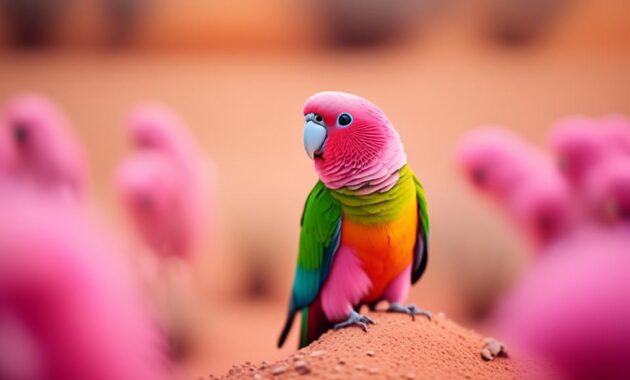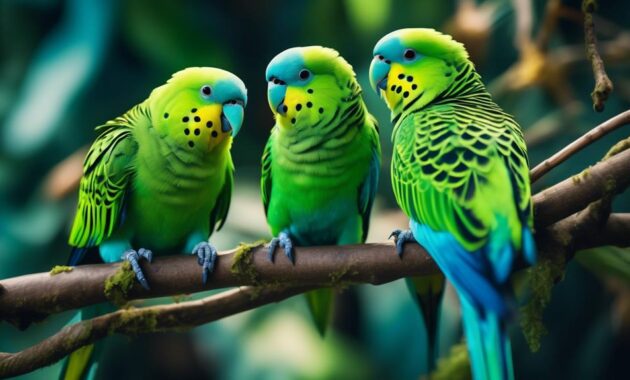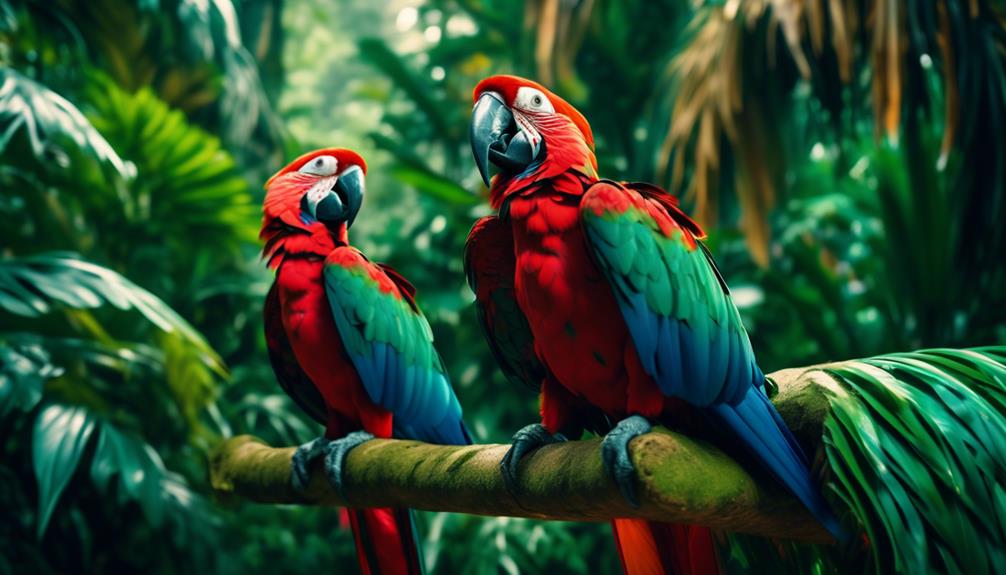
You know what they say – ‘beauty lies in the eye of the beholder.’ And when it comes to the rare and vibrant Military Macaws, their beauty is truly unparalleled. But there’s so much more to these magnificent creatures than meets the eye.
From their stunning physical characteristics to their fascinating behaviors, there’s a whole world waiting to be discovered. So, if you’re curious to unravel the secrets of these captivating birds and understand why their conservation is crucial, join us on this journey of exploration.
Get ready to be amazed by the wonders of the rare and vibrant Military Macaws.
Key Takeaways
- Military Macaws have a lifespan of 60+ years and are slightly smaller than other macaw species.
- Their plumage is primarily green with yellow and lime tones, and they have a bright red forehead.
- Military Macaws are social and friendly birds, capable of mimicking sounds and words.
- They are native to specific regions in South America and are vulnerable to trapping and hunting.
Physical Characteristics and Lifespan
Military Macaws, known for their vibrant plumage, have a lifespan of 60+ years. They’re slightly smaller than other macaw species, measuring around 31 inches long. As adults, they can weigh up to 2.4 pounds.
Their physical features include a white face that turns red when excited. Their plumage is primarily green with yellow and lime tones, while the underside of their wings and tail are bright yellow, and the top side is bright blue. They also have a distinctive bright red forehead.
These remarkable birds aren’t only visually stunning but also known for their longevity, making them a truly remarkable species to behold.
Appearance and Coloration
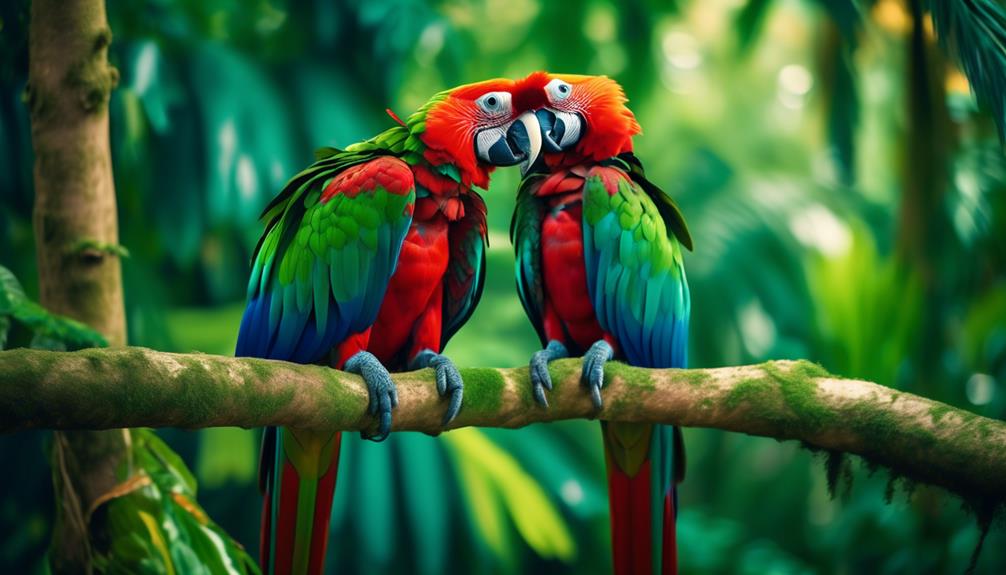
Military Macaws showcase stunning appearance and vibrant coloration that captivate the eyes of anyone who observes them.
Here are four reasons why their appearance is truly captivating:
- Their plumage is primarily green with yellow and lime tones, creating a vibrant and tropical look that instantly catches your attention.
- The bright red forehead adds a pop of color, making them stand out even more among the lush green foliage.
- The underside of their wings and tail are a brilliant shade of yellow, contrasting beautifully with the vivid blue on the top side. It’s a mesmerizing sight when they spread their wings.
- Their white face turns red when they’re excited, adding a dynamic element to their appearance and revealing their emotions in a visually striking way.
With such a stunning array of colors, it’s no wonder that Military Macaws are considered one of nature’s most magnificent creations.
Behavior and Interaction
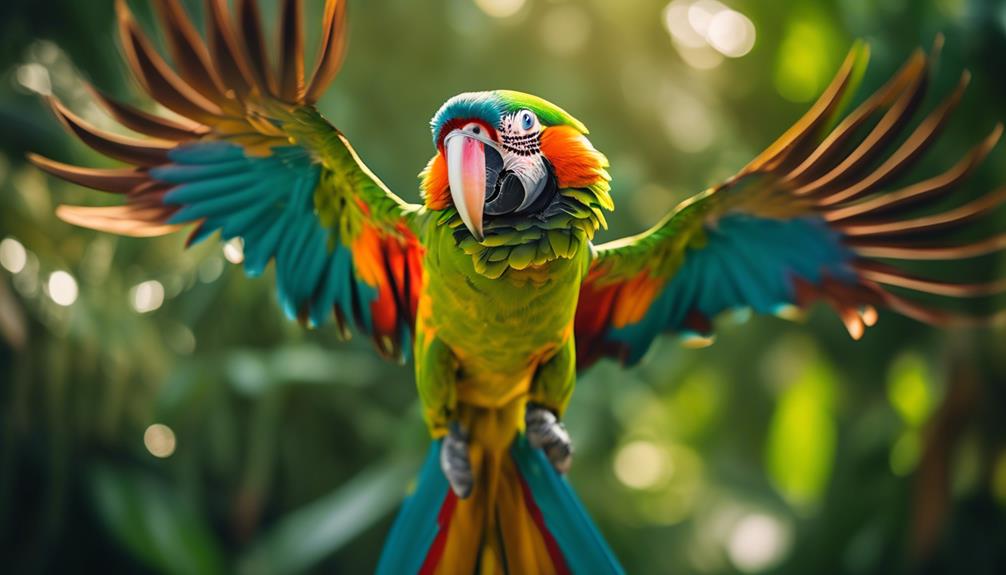
When it comes to their behavior and interaction, Military Macaws are known for their vocal and talkative nature. These vibrant birds love to make their presence known and can be quite chatty. They are capable of mimicking sounds and words, which adds to their charm. Military Macaws are social and friendly creatures, enjoying interactions with humans and playing games. To give you a better understanding of their behavior, here is a table highlighting some key aspects:
| Behavior | Interaction |
|---|---|
| Vocal | Talkative |
| Mimics sounds | Friendly |
| Social | Enjoys interactions |
| Playful | Games |
| Excitement | Can become loud |
As you can see, their behavior and interaction traits make them engaging and entertaining companions.
Habitat and Conservation
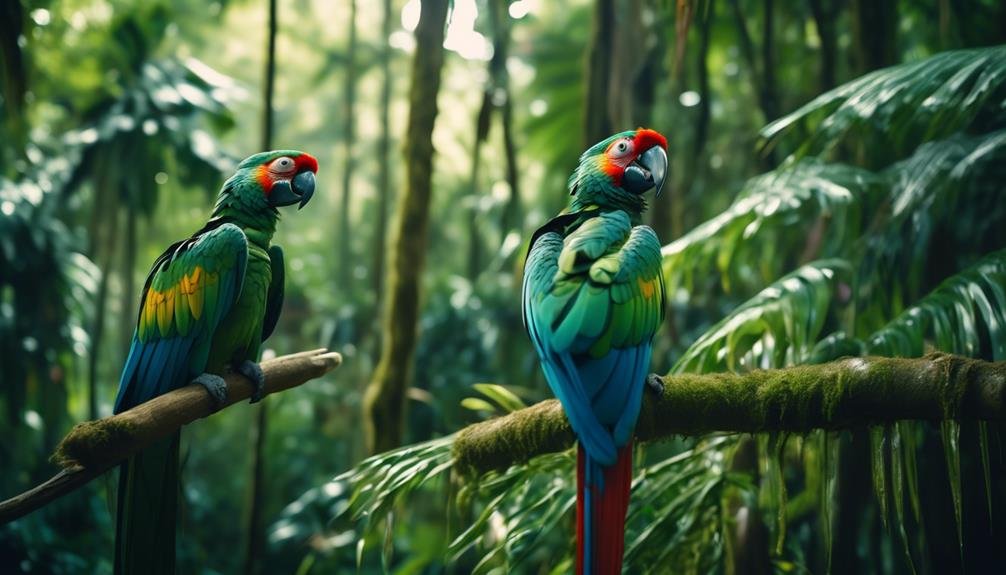
Native to specific regions in South America, the habitat of Military Macaws is limited to high altitude subtropical forests. These majestic birds rely on these unique environments to thrive and survive. However, their habitat is under constant threat, and their conservation is of utmost importance.
Here are four reasons why we should care about preserving the habitat of Military Macaws:
- Biodiversity: By protecting their habitat, we’re preserving not only the Military Macaws but also a wide range of plant and animal species that call these forests home.
- Ecological Balance: These forests play a vital role in maintaining ecological balance, providing essential services like carbon sequestration and water regulation.
- Cultural Importance: Military Macaws hold cultural significance for local communities, serving as symbols of strength and beauty. Preserving their habitat helps protect cultural heritage.
- Species Survival: As these birds face threats like trapping and hunting, safeguarding their habitat is crucial for the long-term survival of the Military Macaw population.
Care and Health
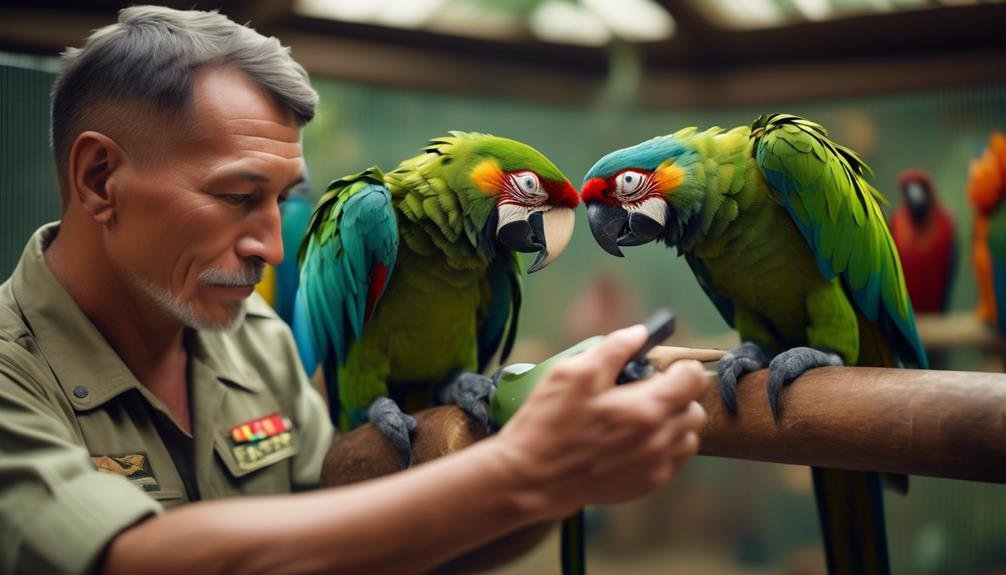
Preserving the habitat of Military Macaws is crucial, and taking care of these majestic birds is equally important to ensure their well-being and longevity.
To keep your Military Macaw healthy, provide them with a balanced diet of commercial seed and pellet mixes, supplemented with fresh fruits, berries, and green vegetables. You can also occasionally give them cooked foods like rice, chicken, and corn.
Regular showers are essential to maintain the health and shine of their feathers. By providing them with proper nutrition and hygiene, you can help them live a long and fulfilling life.
These birds are naturally healthy, but it’s important to give them the care they need to thrive. Remember, your efforts in caring for them will contribute to their overall well-being.
Diet and Nutrition
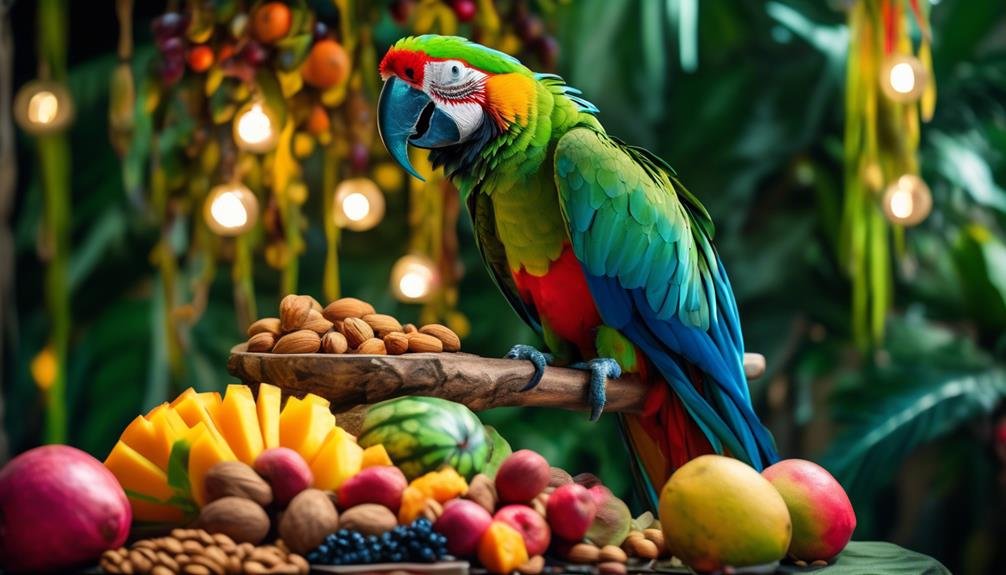
To ensure the optimal health and well-being of your Military Macaw, it’s essential to provide them with a balanced diet and proper nutrition. Here are four key points to consider:
- Variety: Offer a variety of foods to meet their nutritional needs. This includes commercial seed and pellet mixes, fresh fruits, berries, and green vegetables. The diverse range of nutrients will keep your Macaw healthy and happy.
- Occasional Treats: Treat your Macaw with occasional cooked foods like rice, chicken, and corn. This will add variety to their diet and make mealtime exciting.
- Hydration: Ensure your Macaw stays hydrated by providing clean, fresh water at all times. Hydration is crucial for their overall health and well-being.
- Feather Care: Regular showers help maintain the health and shine of your Macaw’s feathers. This not only keeps them clean but also promotes healthy skin and plumage.
Interesting Facts and Trivia
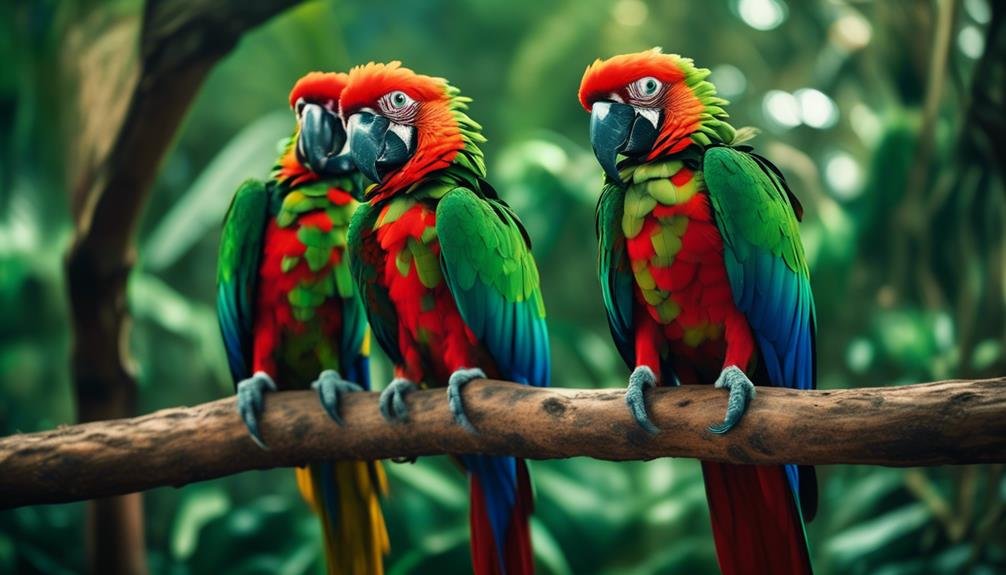
Now, let’s explore some intriguing facts and trivia about Military Macaws that will surely captivate your interest.
| Facts and Trivia | |
|---|---|
| 1. Unique Appearance | Military Macaws have a distinct appearance with their primarily green plumage, bright red forehead, and yellow and blue wings and tail. |
| 2. Long Lifespan | These fascinating birds can live for over 60 years, making them long-term companions. |
| 3. Social and Talkative | Military Macaws are known for their vocal nature and ability to mimic sounds and words. They enjoy interacting with humans and can become quite talkative. |
| 4. Vulnerable Status | Unfortunately, Military Macaws are vulnerable to trapping and hunting, which threatens their population. Conservation efforts are crucial to protect these magnificent birds. |
These facts and trivia shed light on the unique characteristics and challenges faced by Military Macaws, making them even more intriguing creatures to learn about.
Frequently Asked Questions
How Do Military Macaws Communicate With Each Other?
Military macaws communicate with each other through vocalizations, using a variety of calls and squawks. They can mimic sounds and words, and their loudness increases when they are excited or trying to get attention.
Are Military Macaws Endangered?
No, military macaws are not endangered. However, they are vulnerable to trapping and hunting. It is important to protect their habitat and ensure their well-being so that they can continue to thrive in the wild.
Can Military Macaws Be Kept as Pets?
Yes, you can keep military macaws as pets. They are social and friendly birds that enjoy interacting with humans. However, they require a balanced diet, regular showers, and proper care to live a long and fulfilling life.
How Do Military Macaws Defend Themselves From Predators?
Military Macaws defend themselves from predators by using their strong beaks and claws. They can deliver powerful bites and strikes. They may also use their loud calls and screeches to alert other macaws and potential threats in the area.
Do Military Macaws Migrate to Different Locations During Certain Times of the Year?
No, military macaws do not migrate to different locations during certain times of the year. They are native to specific regions in South America and prefer to stay in their high altitude subtropical forest habitats.
What Makes Military Macaws and Severe Macaws Different in Terms of Their Behavior and Care Requirements?
When considering severe macaws as pets, it’s essential to note their distinct behavior and care requirements compared to military macaws. Severe macaws are known for their energetic and playful nature, requiring ample mental stimulation and social interaction. Proper care involves providing them with a spacious enclosure and a balanced diet to ensure their well-being.
Conclusion
In conclusion, the rare and vibrant Military Macaws are truly captivating creatures with their stunning physical characteristics and friendly nature.
Their vibrant plumage, social behavior, and impressive lifespan make them a joy to interact with.
However, their limited habitat and the threats they face highlight the importance of conservation efforts.
By understanding their care and health requirements, we can ensure these incredible birds live a long and fulfilling life.
Join us in appreciating the fascinating world of Military Macaws and working towards their protection.


